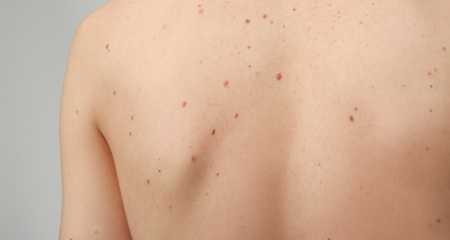
Many individuals often overlook their moles unless they’re prominently visible on the face or any other aesthetic-sensitive area. Yet, regular mole monitoring is vital, as these seemingly harmless spots can transform into melanoma, a perilous form of skin cancer. At Texas Dermatological Clinic, our board-certified skin experts conduct thorough skin checks, scrutinizing any moles that seem out of the ordinary. Should you wish to eliminate a mole for cosmetic purposes or have concerns about its appearance, don’t hesitate to book a consultation online or ring our office.
Moles are clusters of melanocytes (pigmented cells) which appear as growths on the skin. They are extremely common (the majority of individuals have moles) and can range from your natural skin color to pink, blue, brown or black. Moles start appearing during childhood and can grow during adolescent years. New moles that appear during adulthood can be a potential sign of melanoma, and should be evaluated by a board-certified dermatologist.
Regular skin exams by a board-certified dermatologist can help identify signs of Melanoma. You can also perform self-skin-checks to look for the warning signs of melanoma. Check your moles for the following:
If a mole exhibits any of these traits, or has signs of bleeding or discomfort, be sure to request a Skin Cancer Screening with a specialist at Northstar Dermatology
If upon exam a mole appears to have characteristics of abnormality or skin cancer, a biopsy may be recommended. The lesion will be numbed, and a thin blade will be used to delicately shave off the surface tissue of the mole to send to a pathology lab. The pathologist will then examine the microscopic features of the tissue to confirm the exact diagnosis or extent of abnormality. If skin cancer is found, excision or further treatment will be recommended to remove the remaining skin cancer cells from the base of the lesion. Some moles with atypical features may also be recommended for excision to prevent future development of melanoma, while others may be mild enough to recommend monitoring.
Dermatologists are expert trained in evaluating the features of moles, and can get a close look at the tissue characteristics using a special dermatoscope. Consult with the board-certified dermatologists at Northstar Dermatology for evaluation of any new or changing moles.
